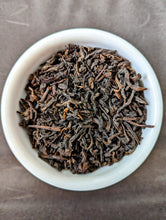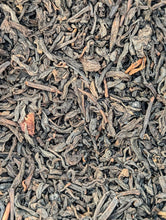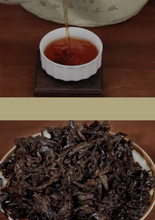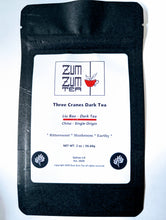Country of Origin: China (Liu Bao)
Notes:
You might be saying to yourself what is Dark tea? Don’t be surprised if you are crossing this term for the first time. In fact, we find it amazing that in the world of tea, you can always learn new things. To begin with, there are 5 main types of varietals of tea, namely, white, black, green, oolong and pu-erh (herbals are seperate as they aren't the same plant that these are). You can find it in almost every standard tea books that those are the 5 main types; however, if you look a bit deeper, you will find that Dark tea is the larger set, in which Pu-erh tea belongs in. This term, Dark tea, is highly replaced with Pu-erh, because in the western world, it is the only/main Dark tea that is consumed and sold.
In 2008, China recognized Dark tea from Yunnan as being geographically protected meaning this is the only dark tea that can be called Pu-erh despite the fact that a number of other provinces produce fermented dark teas using much the same process and tea plant varieties. So quite literally all Pu-erh tea is Dark tea but not all Dark tea is Pu-erh. Sort of like Kona coffee is only from Kona or how Champagne can only be called Champagne if it's from the Champagne region. Much the same with Darjeeling tea in India.
Our Three Cranes Dark Tea is from the Liu Bao Village in Guangxi. Liu Bao tea, is a tea of history. It is one of the oldest styles of tea preparation that is still preserved and drank to this day. It is an excellent example of the trade routes that existed many years ago when the nomadic people of faraway places used to depend on the tea supply received from the warmer climates of China. The fermentation that the tea undergoes helps it survive the long journeys. "Liu Bao" literally translates as "Six Castles," which refers to the forts in the specific part of Guangxi long ago.
Liu Bao dates back to the Tang Dynasty (618 - 907). Of course, its production and drinking ways had very little in common with the Liu Bao we know today, but they were producing their own tea and trade. Later during the Qing Dynasty (1644 - 1912), it was one of the most highly prized teas. Nobles would drink it daily for health and beauty or as a gift it to visitors and travelers.
The processing methods of Liu Bao served as the base for modern-day Ripe (Shou) Pu-erh preparation (which developed fully in the 1970s). The two teas go through very similar processing partially because they are both part of the Dark tea category. First, the raw tea leaves undergo gradual pan-frying, rolling, and drying stages, becoming the loose-leaf. Next, tea leaves are piled and exposed to high humidity until reaching the desired fermentation level. Finally, the leaves are steamed and pressed into large bamboo baskets. After the tea leaves are packed into the baskets, they are left to air-dry for several months and then aged even further.
It is an excellent tea, with the fermentation process acting as a probiotic of a sort it is known for possibly clearing intestines. When drunk after eating, it may break down heavier foods and aid digestion. Dark tea is also known to have a calming effect that may clear the mind and help focus. Many notice that drinking Dark tea is both comforting and motivating. In a sense, it is a tea of contrasts, which is indeed what we love about it.
Ingredients: Single Origin Premium Loose Leaf Tea








